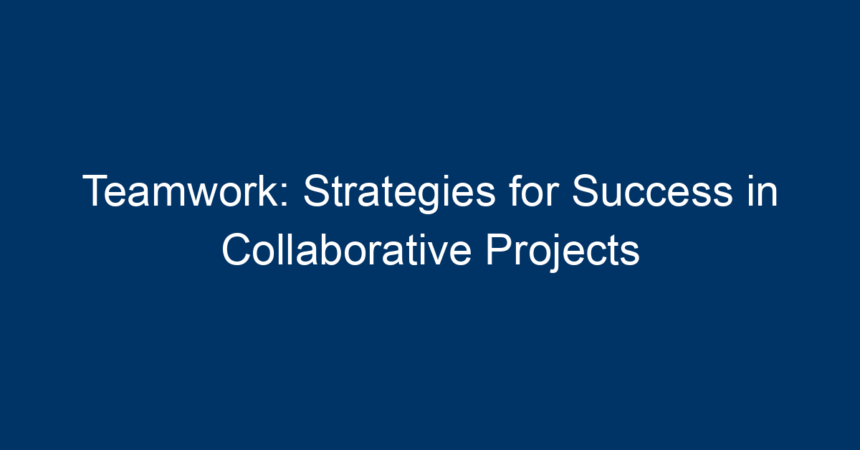In today’s fast-paced business environment, effective teamwork is more vital than ever. Whether you’re embarking on a new project, transitioning to remote work, or navigating complex challenges, cultivating a collaborative culture can be the cornerstone of success. This article explores essential strategies to enhance teamwork, ensuring your collaborative projects flourish.
Understanding Teamwork
Teamwork is the harmonious collaboration between individuals to achieve a common goal. It involves sharing ideas, distributing tasks, and fostering a sense of community. When executed well, teamwork can lead to innovative solutions, increased productivity, and improved morale among team members.
The Importance of Teamwork
Great teamwork can transform a group of individuals into a high-performing team. The benefits include:
- Enhanced Creativity: Diverse perspectives lead to innovative ideas.
- Improved Problem-Solving: Team members can troubleshoot and come up with solutions faster.
- Increased Efficiency: Delegating tasks allows teams to complete projects quickly.
- Boosted Morale: Working together fosters a sense of belonging and support.
Key Strategies for Effective Teamwork
1. Set Clear Goals and Roles
Setting clear goals is the foundation of successful teamwork. Teams with well-defined objectives are more likely to stay focused and motivated. Here’s how to effectively set goals:
- SMART Goals: Ensure goals are Specific, Measurable, Achievable, Relevant, and Time-bound.
- Define Roles: Clearly outline each team member’s responsibilities. This prevents overlaps and confusion, allowing everyone to excel in their respective areas.
2. Foster Open Communication
Communication is the lifeline of teamwork. It promotes transparency, builds trust, and helps mitigate misunderstandings. To foster open communication:
- Encourage Feedback: Create an environment where team members feel comfortable giving and receiving constructive feedback.
- Utilize Technology: Platforms like Slack, Microsoft Teams, or Zoom can facilitate better communication, especially in remote settings.
- Regular Check-ins: Hold weekly or bi-weekly meetings to discuss progress and address any blockers.
3. Build Trust and Respect
Trust and respect are critical elements in sustaining teamwork. When team members trust one another, they are more likely to share ideas and collaborate effectively. Here are strategies to foster trust and respect:
- Encourage Team Bonding: Organize team-building activities, whether in-person or virtual. These activities can help team members connect on a personal level.
- Be Transparent: Share successes and challenges openly. Transparency fosters a culture of trust.
- Model Respect: Lead by example. Treat every team member with respect to cultivate a unified team culture.
4. Embrace Diversity
Diversity is a powerful catalyst for creativity and innovation. Embracing different backgrounds, perspectives, and skills can enhance your team’s performance. To harness diversity:
- Promote Inclusion: Ensure that all team members feel valued and included in discussions. Diversity programming, such as workshops and training, can help.
- Leverage Strengths: Identify each team member’s strengths and assign tasks accordingly. This ensures that everyone is playing to their strengths.
5. Leverage Technology
In our digital age, technology can significantly enhance teamwork. From project management tools to communication platforms, leveraging the right technology can make collaboration seamless. Consider the following:
- Project Management Tools: Platforms like Asana, Trello, or Jira help teams stay organized and track progress.
- Document Sharing: Tools like Google Drive or Dropbox can facilitate easy access to project documents, ensuring everyone is on the same page.
- Virtual Whiteboards: Tools like Miro or Jamboard can help teams brainstorm and visualize ideas, even remotely.
Navigating Challenges in Teamwork
1. Conflict Resolution
Conflicts are natural in any team environment. However, how a team addresses conflict can define its success. Here are steps to manage disagreements effectively:
- Address Issues Early: Don’t let conflicts fester. Address them promptly to prevent escalation.
- Listen Actively: Encourage all parties to express their viewpoints, ensuring everyone feels heard.
- Seek Common Ground: Focus on finding solutions that satisfy all parties involved.
2. Maintaining Motivation
Keeping team morale high can be challenging, especially during tedious or prolonged projects. Here’s how to keep motivation levels up:
- Celebrate Milestones: Acknowledge achievements, no matter how small. Celebrating success fosters a positive atmosphere.
- Continuously Engage: Keep engagement levels high by rotating responsibilities or introducing new challenges to keep the work dynamic.
- Provide Support: Be attentive to individual needs and challenges. Offering support helps team members feel valued and motivated to contribute.
Conclusion: Take Action for Effective Team Collaboration
Effective teamwork is essential for success in collaborative projects. By setting clear goals, fostering open communication, building trust, embracing diversity, and leveraging technology, teams can overcome challenges and achieve extraordinary results.
Actionable Insights
- Conduct Regular Team Assessments: Evaluate your team’s dynamics regularly to identify strengths and areas for improvement.
- Invest in Team Development: Provide training opportunities that focus on enhancing communication, conflict resolution, and team collaboration skills.
- Create a Safe Space for Ideas: Encourage all team members to share their thoughts without fear of judgment.
By focusing on these strategies, your team can unlock the power of teamwork, leading to successful and fulfilling collaborative projects. As you embark on your next endeavor, remember that the strength of your team lies in its ability to work together effectively.




